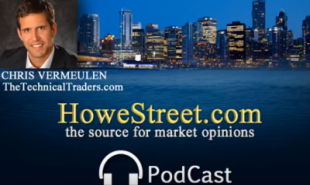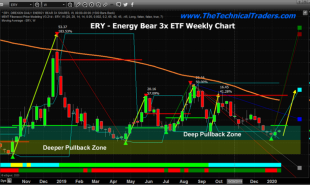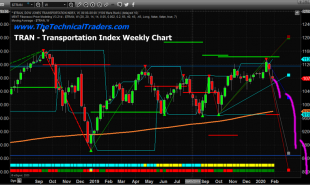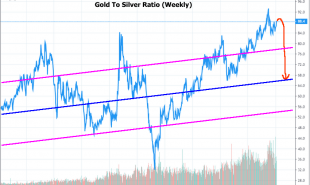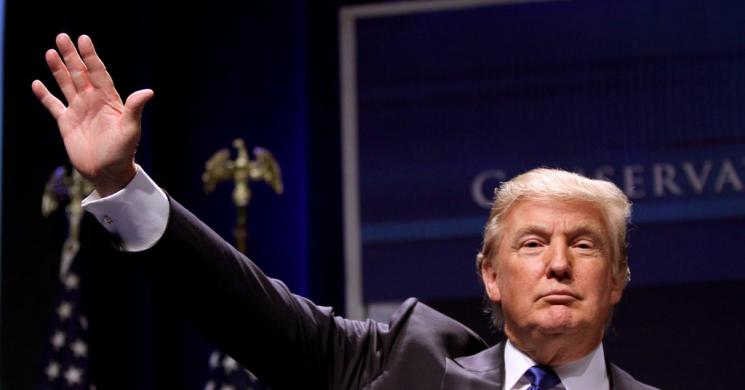
How Investors Should View Trump's Terrible, Horrible, No Good, Very Bad Day
Via theoutsiderclub
By now, no doubt, you've heard of what happened with Trump, Congress, and health care on Friday.
The media is running with it, talking up how he could hardly have done worse. Which would basically put it on par with every other day of his presidency, according to them. I honestly don't know if I have ever seen such gleeful schadenfreude.
The stock market doesn't seem to have liked it either, with the indices spiking down at the start of trading this morning, the VIX up double digits, and gold at or around the highest price it's seen in months.
Let's ignore the partisans, selective memories, and propaganda for a couple minutes and talk about what is really happening, and what this really means for us as investors.
Everyone, and No One, to Blame
The only lesson President Trump has to learn from the failed attempt to force a vote is that he doesn't have any say in what he gets credit for anymore. It all gets heaped on him.
Walking away from a deal is a time-tested strategy. You punt it forward, reset the field, and try again. It works everywhere, except Washington, D.C.
This was never Trump's issue, he just promised to support repeal and replace. Trump is no health care policy wonk, he knows it, and he purposefully deferred to Congress on this one. If anything, blame him for putting any modicum of trust in career politicians.
Many incumbents who won this last election on a repeal and replace platform have served in Congress for as long as Obamacare has been in place. They should have had a legitimate plan in place years ago that they could dust off, tweak, and pass in days.
The blame falls on Congress, for sure. They're the ones who write, pass, and repeal laws. But the U.S. government has just about the slipperiest blame game known to humanity.
Without a President and strong Congressional leadership that can whip them into place, Congress doesn't even have to let a tally of votes go on record.
So, everyone is to blame, but also no one in particular. It is entirely everyone's fault, but who can blame just one person for it? There is always another finger pointed at someone else, until a full circle forms.
Eventually no one cares, and it is cocktail hour at a fundraiser, and at long last, the weary politicians can move on to something they truly care about.
Party/ Counter-party
The other thing that must be considered is the unique nature of our government. There is always a party and counter-party relationship, even within the same party.
In years past, the parties were more mixed across the liberal-to-conservative spectrum. Republicans had their more liberal East Coast enclaves. Democrats had their blue dog and Dixie democrats.
Now, the internal makeup of both parties is straining under the two-party system. In a split government, the fault lines are drawn between the two parties. In a lopsided one-party government like the one we have today, the fault lines are drawn within the ruling party itself.
For years, this hasn't really happened in the Republican party. At least, not to the extent it will now. Every issue will have to be defined in this context. Old and new divisions have to be mapped out.
That is exactly what we just saw happen. Agreeing on principle doesn't translate to agreeing on particulars. Congress got spooked and its members did what they do best — duck and cover in the safest spot possible.
Mitch McConnell isn't the only turtle on Capitol Hill, though he may most resemble one.
Investors and the Market
Now, let's get to the part that really matters in the short term. Investors and the market are reacting the way they should.
Not necessarily because of what just happened in politics, but because of what has happened since the election in the markets.
The run up we've experienced is simply unjustified. Valuations have been built up into a precipice that will result in many portfolios taking a dive.

Look at that gap between share prices and earnings per share. There will be a reversion to the mean eventually, and there is little evidence that EPS can or will surge to close the gap this year.
That leaves a price drop as the most likely scenario.
Investors collectively decided to front-run a pro-business, corporatist platform, mainly the tax reforms and infrastructure spending promised.
After eight years of Obama, who may have been willing to work against corporate interest more, if he kept a Democratic Party-controlled Congress in place, the crowd went wild for anything new.
In the process, they forgot that nothing happens fast inside the D.C. Beltway, and that what comes out the backside of the process hardly resembles what went in the front.
And so now investors question the President's ability to seal the deal, completely externalizing the fact that they drove up the share prices that they are now worried about.
What to Really Worry About
Unless you're in insurance or health care stocks, what panned out over last Thursday and Friday really doesn't matter much to investors. Republicans are going to save that little gem for the midterm election. They've won big on it, and they'll milk it dry.
We should be looking at the tax reforms with a bit of concern, but the basics of that will be easier. Unlike health care laws, it is far easier to do that piecemeal.
And for many Republicans, any reduction in taxation is a win. They won't vote against it because one group didn't get as much of a cut as they wanted.
They'll sign, say, a 5% cut, and fight for another 5% later. They get to deliver something, and promise more if re-elected. Win-win.
The infrastructure spending is going to be a really rough one. It opens up a whole slew of issues. Every member of Congress will want to simultaneously deliver more to their district while cutting the overall amount available.
This will create a zero-sum game inside the Republican party. Then there are some other realities to face. A lot of the infrastructure spending that would produce meaningful gains is in and around urban centers. Those are dollars that won't get Republicans votes.
And all it takes is one person to call it an unfunded spending increase for everyone to run back to their safe space and retract into their shells.
Then there is the debt ceiling. We're already past it, and something needs to be done before October. This is now a huge question mark. It is either going to be a massive problem, or none at all.
Yes, debt is well past the incomprehensible level, but Congress already wrote the check. The issue isn't the debt ceiling, it is the generations of deficit spending.
If Congress wanted to actually do anything other than ruffle their feathers and put on a show, they'd authorize the Dept. of the Treasury to pay their bills, and then be vigilant about what they buy.
Do you think it is okay for people to blame their credit card limits for their spending problems? That's all the debt ceiling is, plus Congress gets to increase the limit themselves.
It should always be a nonissue. It only isn't when imbeciles want to have their cake (fiscal conservative credentials) and eat it too (rampant spending.)
So What Should Investors Do?
The first thing investors should do is realize that this health care thing is not a big deal in the market outside of the insurance and health care sectors.
Second, they should be aware that the market is way out on a limb, and there is no rising tide in the fundamentals that will catch up to share valuations and justify them at current levels at least through 2017.
And third, investors should realize that how the market reacted will be repeated several more times. The indices and large-cap stocks will pull back. The dollar will weaken and gold will jump whenever a similar event occurs.
In a time of extreme valuations, high risk hidden by artificially low interest rates, and political turmoil, keeping a portion of your total portfolio in gold is a classic hedge for this kind of scenario.
More and more investors will do this each time the U.S. government stumbles, and that is why we're now seeing gold at or near a four-month high. Gold miners are doing even better, and will continue to going forward for myriad reasons.
So keep yourself prepared for a rough spring and summer, with every major vote in Congress being a potential downward catalyst.
The market needs to shake off its irrational exuberance regarding the new administration, and if you let it, it'll do so at your expense.
Read more by Soren K.Group



